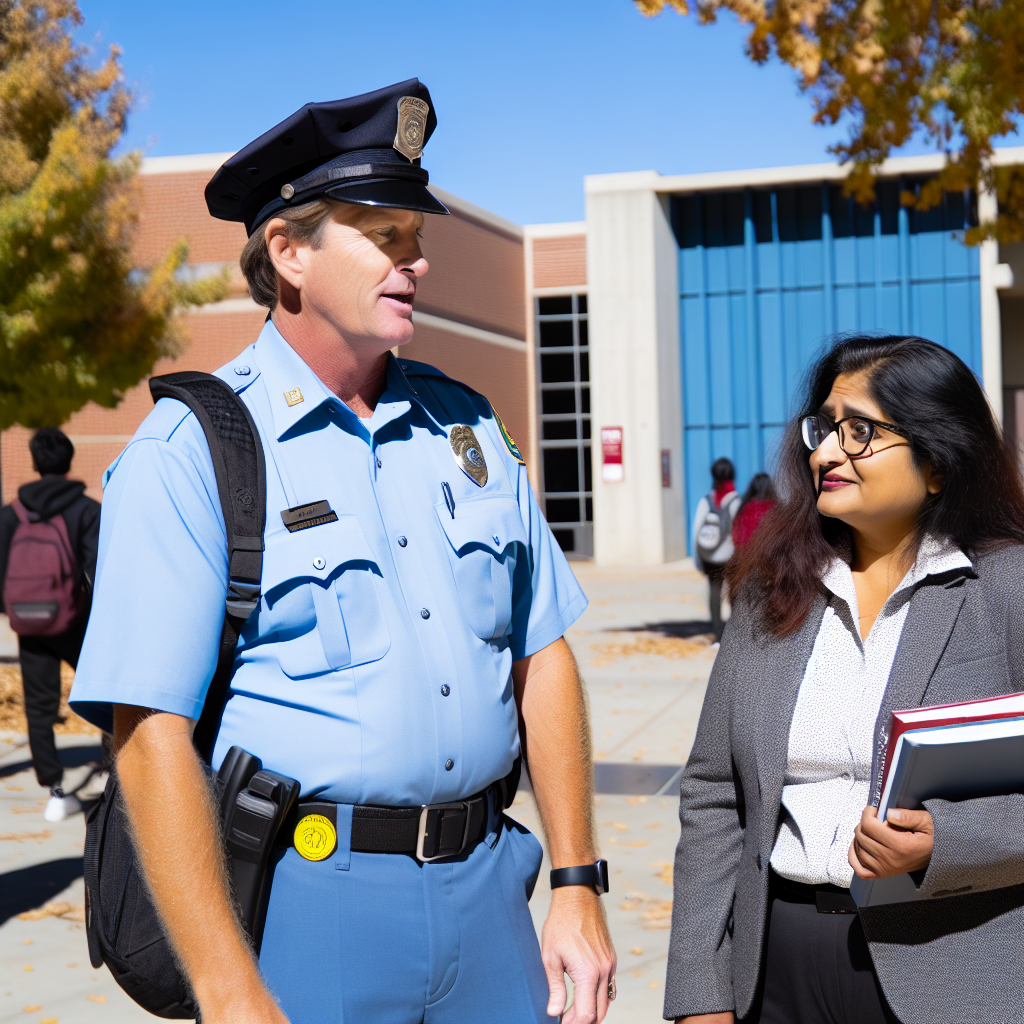Introduction:
Campus security officers play a crucial role in maintaining safety and security on campus.
Collaboration between security officers and faculty is essential to ensure a secure learning environment.
Security officers can provide valuable insights and support to faculty members in various situations.
Regular communication and coordination between security officers and faculty can help in preventing potential security threats.
Faculty members can share information about any concerning behaviors of students with security officers.
In emergency situations, security officers can assist faculty in implementing safety protocols effectively.
Training sessions and workshops can be organized to enhance collaboration between security officers and faculty.
Together, security officers and faculty can create a culture of safety and vigilance on campus.
By working together, they can address security issues promptly and effectively to protect everyone in the campus community.
The Role of Campus Security Officers:
Outline the duties and responsibilities of campus security officers:
Campus security officers play a vital role in ensuring the safety and security of students, faculty, and staff on campus grounds.
Their duties and responsibilities include:
- Patrolling campus buildings and grounds to prevent crime and enforce regulations.
- Responding to emergency situations such as accidents, fires, or medical incidents.
- Monitoring surveillance cameras and alarms to detect any suspicious activity.
- Assisting with crowd control during events or protests on campus.
- Providing escort services to students and employees walking alone at night.
- Collaborating with local law enforcement agencies to investigate criminal incidents on campus.
- Reporting any safety hazards or maintenance issues to the appropriate authorities.
Mention the skills and qualifications required for the job:
Being a campus security officer requires a unique set of skills and qualifications to effectively perform the duties mentioned above.
Some of the key skills and qualifications include:
- Excellent communication skills to interact with students, faculty, and staff professionally.
- Ability to remain calm and composed in high-stress situations or emergencies.
- Physical fitness and stamina to patrol campus grounds on foot or by vehicle.
- Knowledge of basic first aid and CPR in case of medical emergencies.
- Training in conflict resolution and de-escalation techniques to handle challenging situations.
- Familiarity with security technology such as surveillance cameras and access control systems.
- Completion of specialized training programs in campus security or law enforcement.
Campus security officers play a crucial role in maintaining a safe and secure environment for everyone on campus.
Their dedication and vigilance contribute significantly to the overall well-being of the campus community.
Collaboration for Campus Safety
Collaborating with faculty is crucial for enhancing campus safety and security.
Here are some reasons why this partnership is essential:
- Sharing Important Information
Faculty members are often the first to notice any unusual behavior or potential security threats. By collaborating with them, campus security officers can stay informed about what is happening on campus and take proactive measures to address any concerns. - Building Trust and Rapport
Working together with faculty members helps to build trust and rapport. When both parties are able to communicate openly and effectively, it creates a more cohesive and unified approach to campus security. - Utilizing Different Perspectives
Faculty members bring a unique perspective to the table when it comes to campus security. By collaborating with them, security officers can gain insights and ideas that they may not have considered on their own. - Enhancing Emergency Preparedness
In the event of an emergency, collaboration between campus security officers and faculty members is essential. By working together to create and implement emergency response plans, the entire campus community can be better prepared to handle any situation that may arise. - Improving Communication
Effective communication is key to ensuring campus safety and security. By collaborating with faculty, security officers can work together to develop clear communication protocols and procedures that will help keep everyone on campus informed and safe.
By working together, both parties can create a safer and more secure environment for students, staff, and visitors alike.
Transform Your Career Today
Unlock a personalized career strategy that drives real results. Get tailored advice and a roadmap designed just for you.
Start NowDelve into the Subject: Correctional Officer Physical Fitness Requirements
Building relationships with faculty:
Establishing rapport with faculty members is crucial for campus security officers.
It enhances collaboration and fosters a safe and secure campus environment.
Here are some tips on how campus security officers can build strong relationships with faculty:
- Attend faculty meetings and events:
- Provide campus security updates:
- Offer training sessions:
- Invite faculty feedback:
- Provide direct contact information:
Participating in faculty meetings and events allows security officers to interact with faculty members in a casual setting.
This helps in building familiarity and trust among the faculty.
Regularly update faculty members on any security-related issues or updates on campus.
Keeping them informed shows that their safety is a priority.
Organize training sessions for faculty members on emergency protocols, safety procedures, and how to handle security incidents.
This collaboration enhances preparedness and response efficiency.
Solicit feedback from faculty on security measures and protocols.
This shows that their opinions are valued and helps in tailoring security strategies to meet their specific needs.
Share direct contact information with faculty members for any security concerns or emergencies.
Building a direct line of communication fosters trust and quick response times.
Importance of communication and trust in collaborations:
Effective communication and trust are essential components of successful collaborations between campus security officers and faculty members.
Here are reasons why these elements are crucial:
- Improved response times:
- Enhanced safety awareness:
- Stronger partnerships:
- Effective collaboration:
- Increased sense of security:
Clear communication channels between security officers and faculty members help in faster response times during emergencies or security incidents.
Regular communication about security updates and protocols keeps faculty members informed and aware of safety measures, enhancing overall campus safety.
Building trust through open communication and transparency lays the foundation for stronger partnerships between security officers and faculty members.
Trust-based relationships foster effective collaborations in developing and implementing security strategies that cater to the unique needs of the campus community.
Transform Your Career Today
Unlock a personalized career strategy that drives real results. Get tailored advice and a roadmap designed just for you.
Start NowWhen faculty members trust and communicate effectively with security officers, it leads to an increased sense of security and well-being on campus.
By following these tips and emphasizing the importance of communication and trust, campus security officers can build strong relationships with faculty members.
This leads to a safer and more secure campus environment for everyone.
Delve into the Subject: Wildland Firefighter Coordination with Local Authorities
Training and education:
Training programs that involve both security officers and faculty are crucial in maintaining a safe campus environment.
By equipping both parties with the necessary knowledge and skills, potential security threats can be effectively mitigated.
Educating faculty on security protocols and procedures is essential for creating a collaborative relationship with campus security officers.
When faculty members are well-informed about security measures, they can play a proactive role in ensuring the safety of students and staff.
Training programs that involve faculty help increase their awareness of potential security risks on campus.
By educating them on security protocols, faculty members can better identify suspicious behavior or situations and take appropriate actions to mitigate risks.
Educating faculty on security protocols fosters a culture of safety and security within the campus community.
When everyone is aware of security measures and procedures, they are more likely to cooperate and work together to maintain a safe environment for all.
By involving faculty in training programs, campus security officers can improve response times to security incidents.
Faculty members who are educated on security protocols can act swiftly in emergency situations, thereby minimizing potential harm or damage.
Training programs that involve both security officers and faculty encourage collaborative problem-solving.
By working together, they can address security concerns more effectively and develop comprehensive strategies to enhance campus safety.
Educating faculty on security protocols helps build trust and rapport between security officers and academic staff.
When faculty members understand the challenges faced by security personnel, they are more likely to cooperate and support their efforts in maintaining a secure campus environment.
Training programs that involve faculty can help integrate security measures into their daily routines.
By incorporating security protocols into their teaching and administrative tasks, faculty members can contribute to a safer campus environment without disrupting academic activities.
Transform Your Career Today
Unlock a personalized career strategy that drives real results. Get tailored advice and a roadmap designed just for you.
Start NowTraining programs that involve both security officers and faculty are essential for promoting campus safety and security.
By educating faculty on security protocols and procedures, we can create a collaborative partnership that enhances the overall safety of the campus community.
Delve into the Subject: Work Environment and Conditions for Secret Service Agents

Collaboration in Campus Emergency Response
Emergency response on campus requires collaboration between security officers and faculty for effective outcomes.
Communication is key in emergency situations to ensure everyone is on the same page and informed.
Security officers can provide real-time updates and information to faculty to make informed decisions.
Faculty can assist security officers by organizing students and directing them to safe areas during emergencies.
Collaborating on emergency response plans and drills can help both parties understand their roles and responsibilities.
During a fire drill, security officers and faculty can work together to ensure a smooth and efficient evacuation process.
In an active shooter situation, faculty can assist security officers in securing classrooms and protecting students.
Security officers can provide training to faculty on how to respond to different emergency scenarios effectively.
Faculty can help security officers identify potential risks and vulnerabilities on campus to prevent emergencies.
Joint efforts in emergency response build trust and foster a sense of teamwork between security officers and faculty.
By working together, security officers and faculty can create a safer and more secure environment for everyone on campus.
Collaboration between campus security officers and faculty is essential for effective emergency response.
By communicating, planning, and working together, they can ensure the safety and well-being of students and staff during critical situations.
Successful collaborations in emergency situations strengthen the bond between these two groups.
This ultimately leads to a more resilient and secure campus community.
Gain More Insights: Work Environment and Conditions for CBP Officers
Sharing information and resources:
Importance of Sharing Relevant Information and Resources
Collaboration between campus security officers and faculty is crucial for maintaining a safe environment.
Transform Your Career Today
Unlock a personalized career strategy that drives real results. Get tailored advice and a roadmap designed just for you.
Start NowSecurity officers have access to valuable information and resources that can enhance the overall security of the campus.
By sharing this information with faculty members, they can better prepare and respond to potential security threats.
Whether it’s sharing updates on recent incidents, providing tips on how to handle emergencies, or sharing security protocols, the exchange of information is key to ensuring the safety of students, staff, and visitors.
Strategies for Effective Communication and Collaboration
- Regular Meetings: Schedule meetings between security officers and faculty to discuss any security concerns, updates, and protocols.
- Training Workshops: Organize training workshops for faculty to educate them on basic security protocols, emergency procedures, and how to report suspicious activities.
- Information Sharing Platforms: Establish a secure platform where security officers and faculty can easily share information, updates, and resources.
- Joint Drills and Exercises: Conduct joint drills and exercises with security officers and faculty to simulate emergency scenarios and test response capabilities.
- Encourage Reporting: Encourage faculty members to report any security concerns or incidents they witness on campus.
- Create Emergency Response Plans: Develop comprehensive emergency response plans that involve both security officers and faculty.
Effective Communication for a Safer Environment
Effective communication and collaboration between campus security officers and faculty are essential for maintaining a safe and secure campus environment.
By sharing relevant information and resources, both parties can work together to enhance security measures and respond effectively to potential threats.
Implementing strategies like regular meetings, training workshops, information sharing platforms, joint drills, and encouraging reporting can strengthen this partnership and contribute to a safer learning environment for all.
Collaboration for Campus Safety
Collaboration between campus security officers and faculty is vital to maintaining a safe campus environment.
It allows for sharing of information and resources to address any security concerns effectively.
Encouraging ongoing communication and partnerships between these two groups is essential.
By working together, they can identify potential threats early on and prevent any security incidents from occurring.
This collaboration also helps in creating a sense of community and trust among students, staff, and faculty.
It shows that safety is a shared responsibility and everyone plays a role in maintaining a secure campus.
By building strong relationships and open lines of communication, campus security officers and faculty can respond swiftly to any security issues that may arise.
This proactive approach can help in avoiding any major disruptions to the campus environment.
The collaboration between campus security officers and faculty is crucial for ensuring the safety and well-being of everyone on campus.
It is important to continue fostering this partnership to create a secure and supportive learning environment for all.
Additional Resources
IT Security & Privacy | Office of the VPIT-CIO | University of Michigan




